Table of Contents
Quotation marks are punctuation symbols used to highlight spoken words or specific parts of text. They are essential for clear communication, especially when quoting someone or referring to titles of shorter works like poems or articles.
In this post, we will discuss how to identify and use quotation marks correctly, their rules, and common mistakes to avoid.
What are Quotation Marks?
Quotation marks are punctuation marks used to indicate direct speech, quotes from texts, or titles of short works like articles, poems, or songs. They help distinguish the quoted or spoken material from the rest of the sentence.
Examples:
She said, I will meet you at 5 PM.
He asked, Where is the library?
I just finished reading the poem The Road Not Taken
When to Use Quotation Marks
Quotation marks are used in various situations to clarify meaning and enhance communication in writing.
1. Direct Speech or Dialogue:
Quotation marks are used to enclose the exact words spoken by someone. This helps indicate who is speaking in a conversation.
- She said, I will join you for dinner.
- He asked, Are you coming to the party?
2. Quoting Text:
When you want to reference or quote someone else’s words, use quotation marks to show that the words are not your own.
- According to the author, The journey is more important than the destination.
- The report concluded, Data analysis is crucial for informed decision-making.
4. Words Used in a Special Sense:
Quotation marks can indicate that a word or phrase is being used in a non-standard, ironic, or special sense.
- He is a genius when it comes to solving puzzles.
- The best part of the movie was the ending.
When to Use Single Quotation Marks
Single quotation marks ( ‘ ’ ) are primarily used in specific contexts, especially when you need to quote something within another quote.
1. Quoting Inside a Quote:
The most common use of single quotation marks is when you’re quoting someone who is quoting someone else. This helps to distinguish the inner quote from the outer quote.
- Sarah said, I heard Tom say, ‘I’ll finish the report by Friday.’
- James noted, During the discussion, Emily said, ‘I believe in teamwork.’
2. Titles of Short Works in a Quoted Context:
When you’re quoting a piece of text that includes the title of a shorter work, like an article or a poem, you can use single quotation marks for that title.
- She quoted the poem ‘A Dream Deferred’ while discussing Langston Hughes.
- In his review, he mentioned the song ‘Bohemian Rhapsody’ as a classic.
4. Quoting Titles of Short Works:
Use quotation marks to enclose titles of shorter works such as articles, poems, and short stories.
- I enjoyed reading The Road Not Taken.
- The article 10 Tips for Better Sleep was very helpful.
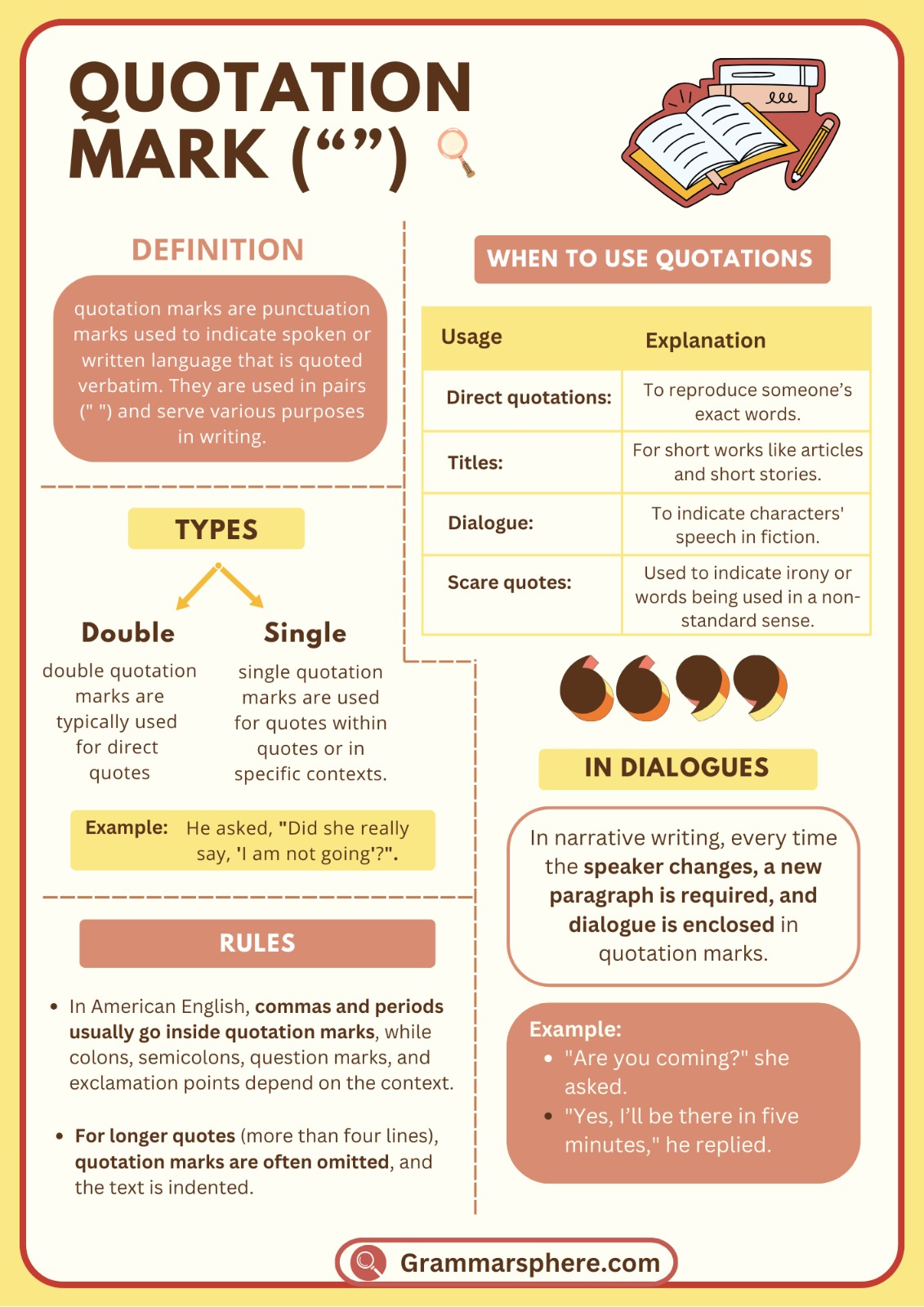
Double Quotation Marks
Double quotation marks ( ” ” ) are used for direct speech, quotations, and titles of short works. They clarify spoken words and reference specific texts. Punctuation like commas and periods usually go inside the quotation marks. They are essential for quoting texts, articles, poems, or songs, ensuring clear and effective communication in writing.
Examples:
- I love reading, she said.
- According to the author, Critical thinking is essential for success.
- I enjoyed the poem The Road Not Taken.
Rules for Using Quotation Marks
| Rule | Description | Example |
|---|---|---|
| Use Quotation Marks for Unfamiliar Terms | When introducing an unfamiliar or slang term, use quotation marks to show that the word is being used in a special way. | The term ghosting refers to suddenly cutting off communication. |
| Avoid Quotation Marks for Emphasis | Do not use quotation marks to emphasize words; instead, use italics or bold text. | Incorrect: This is a very important rule. Correct: This is a very important rule. |
| Use Quotation Marks for Sarcasm or Irony | Quotation marks can indicate sarcasm or irony in a sentence. | He is a genius when it comes to losing things. |
| Do Not Use Quotation Marks for Block Quotes | If a quotation is longer than four lines, format it as a block quote instead of using quotation marks. | The author wrote: It was the best of times, it was the worst of times… |
| Punctuation with Quotation Marks Varies by Style | In American English, commas and periods go inside the quotation marks, while in British English, they go outside unless part of the original quote. | American: She said, Let’s go. British: She said, Let’s go. |
Common Mistakes with Quotation Marks
- Punctuation Outside Quotation Marks
Many writers mistakenly place punctuation marks outside the quotation marks. The correct practice is to place periods and commas inside the quotation marks.
✗ She said, I love this book.
✓ She said, I love this book.
- Using Quotation Marks for Emphasis
Using quotation marks to emphasize a word or phrase is incorrect. Instead, use bold or italics for emphasis.
✗ She is very smart.
✓ She is very smart.
- Not Capitalizing the First Word Inside Quotes
For direct quotes, the first word should be capitalized, especially if it begins a complete sentence.
✗ He said, let’s go to the park.
✓ He said, Let’s go to the park.
- Using Quotation Marks for Titles of Longer Works
Quotation marks should not be used for titles of longer works like books or movies. Italics or underlining should be used instead.
✗ I just finished reading Harry Potter and the Sorcerer’s Stone.
✓ I just finished reading Harry Potter and the Sorcerer’s Stone.
- Inconsistent Use of Single and Double Quotation Marks
Make sure to be consistent when using single and double quotation marks. If you start with one style, continue using it throughout your writing.
✗ He said, I heard her say, ‘I’m tired’.
✓ He said, I heard her say, ‘I’m tired.’
Example Sentences with Quotation Marks
- She asked, Can I come with you?
- He said, We need to leave now.
- I read The Old Man and the Sea last week.
- The teacher asked, Who knows the answer?
- She said, I will meet you there.
- The article titled Healthy Habits was interesting.
- He told me, I’m running late.
- I heard her say, I can’t believe this happened.
- The note said, Please don’t enter.
- Hurry up!, he shouted.
FAQS
How do you use quotation marks?
Quotation marks (“ ”) are used to enclose direct speech, quotations, and titles of short works. They also highlight specific words or phrases for emphasis. In dialogue, they indicate spoken words. For example: She said, “I love reading.” Proper punctuation is placed inside quotation marks in American English.
What is quotation mark with example?
A quotation mark (“ ”) is a punctuation mark used to enclose direct speech, quotations, or titles of short works. It highlights specific words or phrases.
Example: She said, “Today is a beautiful day.”
What are the three types of quotation marks?
The three types of quotation marks are:
Double Quotation Marks (“ ”) – Used for direct speech, quotes, and titles.
Single Quotation Marks (‘ ’) – Used inside double quotes or for emphasis in some styles.
Block Quotations – Used for long quotes, usually indented without quotation marks.
What is the difference between single and double quotation marks?
Double quotation marks (“ ”) are commonly used for direct speech, quotes, and titles of short works. Single quotation marks (‘ ’) are used inside double quotes or in specific styles for emphasis.
Example: She said, “He told me, ‘I will be late.’” (Single quotes inside double quotes)
You May Also Like

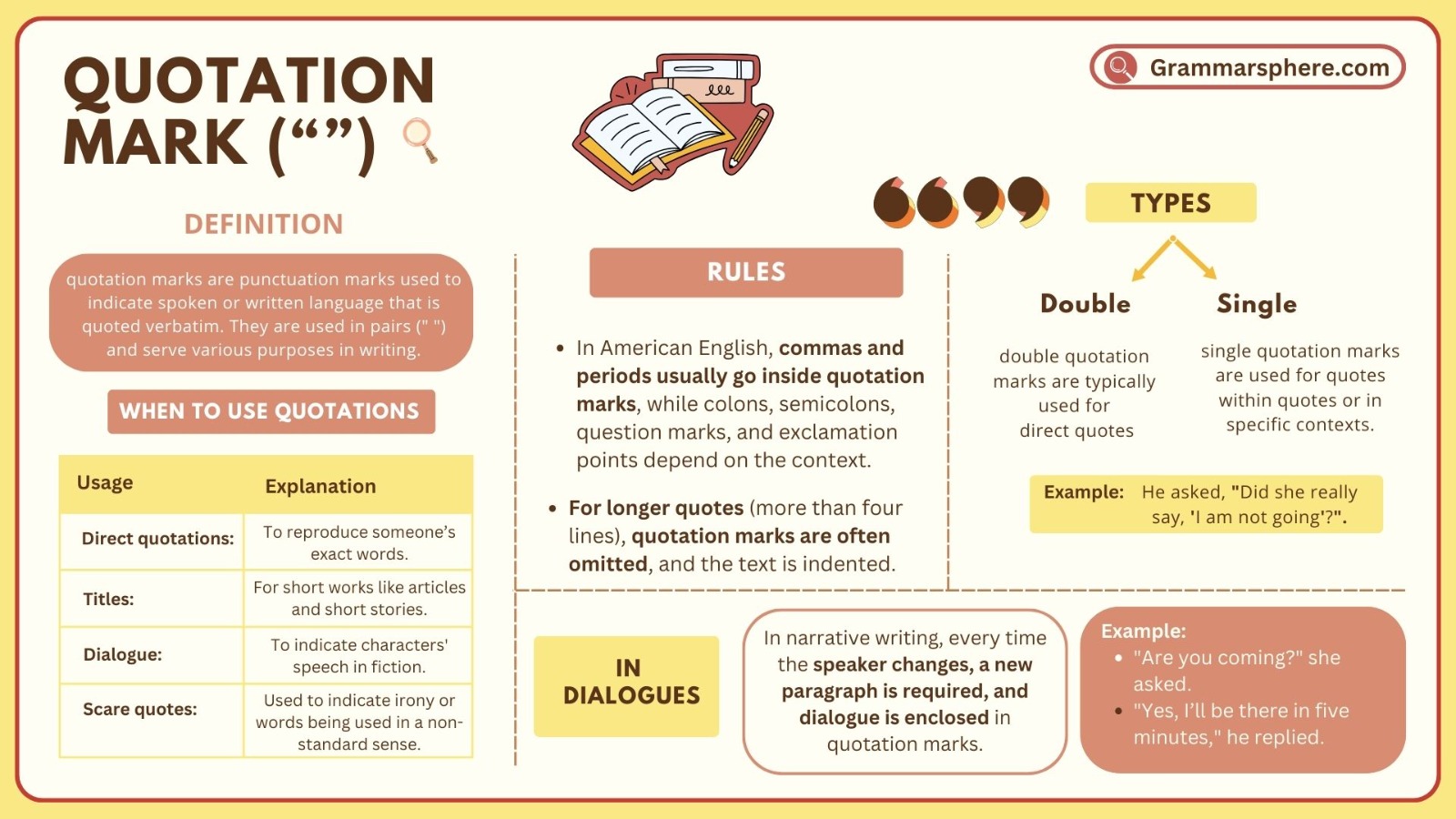
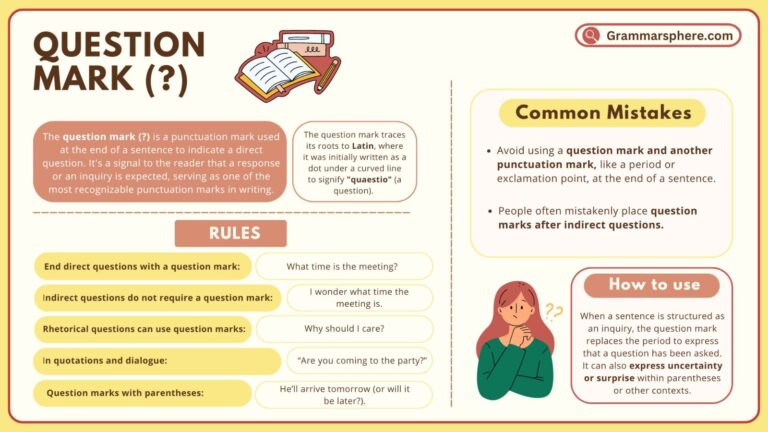
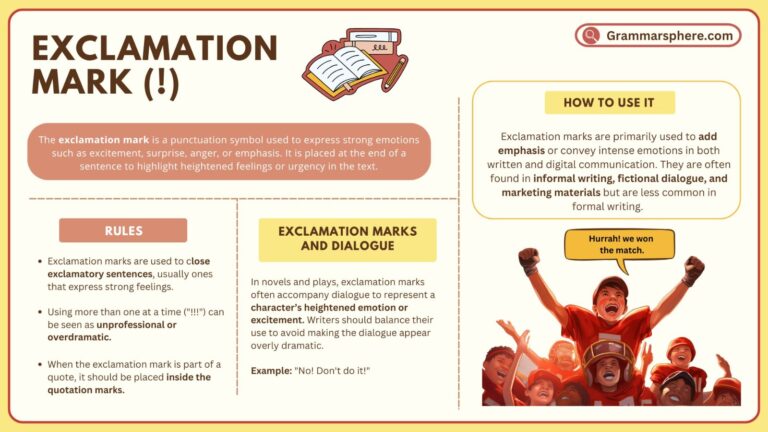


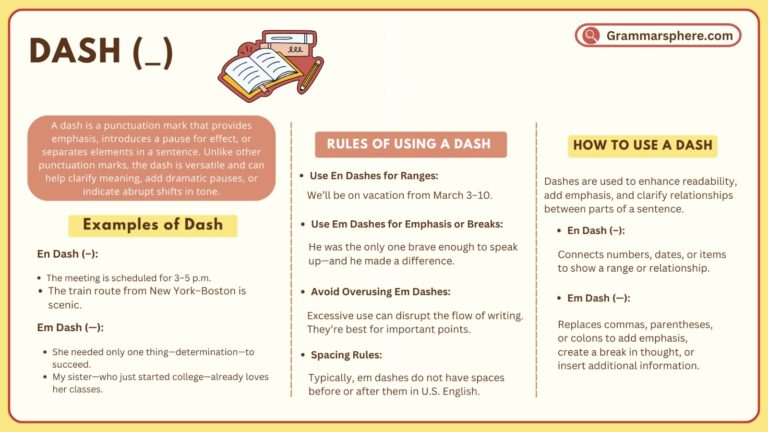
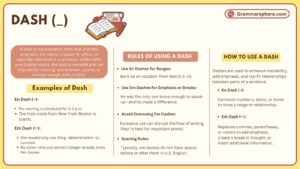
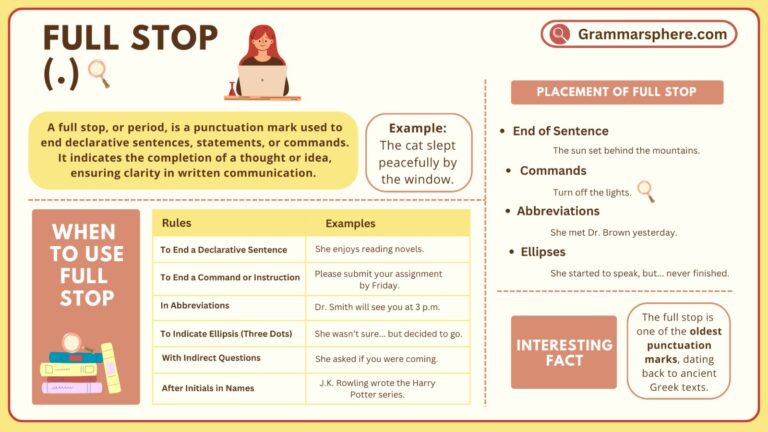
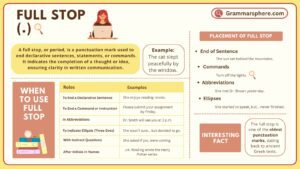
Leave a Comment